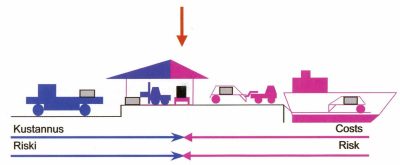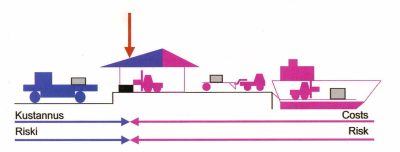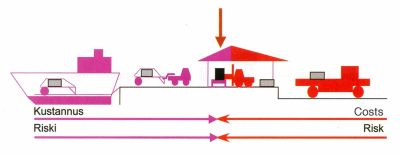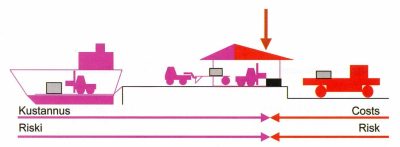Shipping terms, Warehouse Term
Warehouse Term, loading
This Shipping Term can be used when the Contracting Shipper hands the goods over to the Carrier in the warehouse of the port of loading, to be transported.
| Division of costs and risks -- Kustannusten ja riskien jakautuminen | Warehouse Term -- Varastoehto |
|---|---|
 | Warehouse Term, loading, ro-ro -- Varastoehto, lastaus, ro-ro |
 | Warehouse Term, loading, storo and conventional -- Varastoehto, lastaus, storo- ja konventionaalinen |
| Warehouse Term, loading: The Contracting Shipper | Warehouse Term, loading: The Carrier |
|---|---|
1 Delivering the goods to the Carrier The Contracting Shipper delivers the goods to the Carrier to the warehouse named by the Carrier in the port of loading at the time stipulated. The Contracting Shipper hands the goods over to the Carrier
| 2 Taking delivery of the goods from the Contracting Shipper The Carrier takes delivery of the goods from the Contracting Shipper in the warehouse named by the Carrier in the port of loading at the time stipulated. The Carrier receives the goods from the Contracting Shipper
|
3 Division of costs The Contracting Shipper bears all costs of delivering the goods in accordance with 1. Should the Contracting Shipper fail to deliver the goods in accordance with 1 or should he fail to fulfil the obligations defined in 7, he is liable for all direct costs thereby incurred to the Carrier. | 4 Division of costs The Carrier bears all costs of taking delivery of the goods and of carrying them after he has received the goods in accordance with 2. These costs include bringing the roro-unit to the loading point, cleaning it, covering it and otherwise preparing it, checking the goods, counting them and reporting, fastening the goods to the roro-unit, moving the loaded roro-unit to the terminal and keeping it there, and other activities related to the above and consequent upon them. Should the Carrier fail to take delivery of the goods in accordance with 2 or should he fail to fulfil the obligations defined in 8, he is liable for all direct costs thereby incurred to the Contracting Shipper. |
5 Division of liability The Contracting Shipper bears all liability for loss of or damage to the goods until he has handed them over in accordance with 1. | 6 Division of liability The Carrier bears all liability for loss of or damage to the goods after he has received the goods in accordance with 2. Should the Carrier fail to take delivery of the goods in accordance with 2, he bears all liability for loss of or damage, thereby incurred, to the goods. |
7 Other obligations The Contracting Shipper must provide suitable packing for the goods and mark them so that they can be handled in a normal way and be identified as the contract goods. The goods must be in an appropriate order for handling and carriage. The Contracting Shipper must give the Carrier sufficient information of the goods, and of their delivery, in due time before the delivery. | 8 Other obligations The Carrier must give the Contracting Shipper, in due time, notice as to when the goods must be ready for loading. In the case of roll-on/roll-off transports, the Carrier must give the Contracting Shipper instructions on how to load the goods on the roro-unit. |
Warehouse Term, discharge
This Shipping Term can be used for all methods of cargo handling when the Carrier hands the goods over to the Consignee in the warehouse of the port of discharge.
| Division of costs and risks -- Kustannusten ja riskien jakautuminen | Warehouse Term -- Varastoehto |
|---|---|
 | Warehouse Term, discharge, ro-ro -- Varastoehto, purkaus, ro-ro |
 | Warehouse Term, discharge, storo and conventional -- Varastoehto, purkaus, storo ja konventionaalinen |
| Warehouse Term, discharge: The Carrier | Warehouse Term, discharge: The Consignee |
|---|---|
1 Delivering the goods to the Consignee The Carrier delivers the goods to the Consignee in the warehouse named by the Carrier in the port of discharge at the time stipulated. The Carrier hands the goods over to the Consignee
| 2 Taking delivery of the goods from the Carrier The Consignee takes delivery of the goods from the Carrier in the warehouse named by the Carrier in the port of discharge at the time stipulated. The Consignee receives the goods from the Carrier
|
3 Division of costs The Carrier bears all costs of delivering the goods in accordance with 1. Should the Carrier fail to deliver the goods in accordance with 1 or should he fail to fulfil the obligations defined in 7, he is liable for all direct costs thereby incurred to the Consignee. | 4 Division of costs The Consignee bears all costs of taking delivery of the goods after he has received the goods in accordance with 2. Should the Consignee fail to take delivery of the goods in accordance with 2 or should he fail to fulfil the obligations defined in 8, he is liable for all direct costs thereby incurred to the Carrier. |
5 Division of liability The Carrier bears all liability for loss of or damage to the goods until he has handed over the goods in accordance with 1. | 6 Division of liability The Consignee bears all liability for loss of or damage to the goods after he has received the goods in accordance with 2. Should the Consignee fail to take delivery of the goods in accordance with 2, he is liable for all direct costs thereby incurred to the Carrier. |
7 Other obligations The Carrier must give the information necessary for taking delivery of the goods in due time before the delivery. The information must be given to the person named by the Contracting Shipper. If the Carrier is unable to give this information to the named person, he can give it to the owner of the cargo, or, if he does not know who is the owner, to the Contracting Shipper. The Carrier must give notice to the person defined in this paragraph, when and where he can take delivery of the goods. | 8 Other obligations The Consignee must seek information relating to the delivery as defined in 7 from the Carrier in due time. The Consignee must give the Carrier, in due time, notice as to any special requirements relating to the order or manner of delivering the goods. The Consignee bears all additional handling costs incurred directly due to these requirements. |